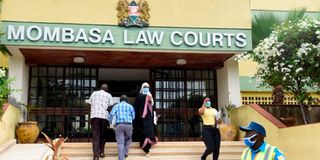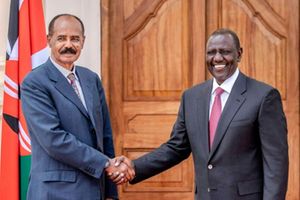Premium
Kadhi blocked from hearing inheritance row involving mixed-faith family members

Mombasa Law Courts.
The High Court in Mombasa has stopped a Kadhi court from presiding over a dispute between a family of both Christian and Muslim faith.
Justice Olga Sewe issued the order stopping the Muslim court in Kwale after one of the parties complained that they were being subjected to a court that could not deal with their issues.
The judge agreed with the petitioner Josephine Kyavi Isika that the jurisdiction of a Kadhi court is limited to determining matters of Muslim law relating to personal status, marriage, divorce or inheritance in proceedings where all parties are Muslims.
"Since the second respondent has conceded that Kyavi Isika is her stepdaughter and that a number of the deceased's beneficiaries are Christians by faith, it is clear that she has met the threshold for the grant of leave," Justice Sewe said.
The woman approached the High Court in March this year to protest a move by Kwale Principal Kadhi Salim Mwaito to proceed with the hearing and distribution of the estate of Chrispus Isika (deceased).
In her court papers, Kyavi claimed that the Principal Kadhi had heard and decided a matter relating to the estate of the deceased, who was a Christian and that some of the beneficiaries of his vast estate were Christians.
She expressed concern that the Muslim court intended to proceed with the hearing and determination of the succession matter before it and the distribution of the deceased's estate, despite its lack of jurisdiction.
"A large number of the deceased's beneficiaries are Christians and therefore do not fall under the jurisdiction of the Principal Kadhi. I seek the intervention of this court," she said.
In his response, Mr Mwaito opposed the application challenging his jurisdiction, arguing that he had not been given sufficient grounds to show that he was not competent to deal with the dispute.
Through a Ms Ambetsa, the Principal Kadhi argued that he had not acted without or in excess of his jurisdiction or failed to comply with the rules of natural justice, where those rules were applicable in the succession case before him.
"Ms Isika has not shown that the decision in the succession and the proceedings thereon are tainted with illegality, irrationality and procedural irregularity," Ms Ambetsa said.
The lawyer argued that the matters at hand touch on religious beliefs and practices and that the Kadhis Courts, although part of the judiciary, are a special category of courts with a mandate to enforce religious practices and events (religious practices) and that their jurisdiction extends to matters relating to succession.
The lawyer further argued that the Principal Kadhi has the necessary jurisdiction to hear and determine the dispute brought before it. "This application is incompetent, bad in law, an abuse of court process and otherwise deliberately intended to frustrate the efficient and timely disposal of the matters before the Kadhi Court," she said.
Mishi Kidzuga, who is also listed as a respondent in the case, acknowledged that Ms Isika was her stepdaughter and that the deceased was originally a Christian by faith.
She pointed out that the deceased converted to Islam in 2009, just before he married her, and that he subsequently changed his name to Abdallah Mnamai Isika.
"The deceased was therefore a Muslim at the time of his death and therefore his estate can only be distributed in accordance with Islamic law through the Kadhi Court," she said.
Ms Kidzuga asked the court to dismiss the application in order to pave the way for the hearing and conclusion of the two inheritance cases pending before the Kadhi court.
In a brief rejoinder and final plea to the court, Mrs Isika, through her lawyer, Mr Abaja, urged the court to take into account Mrs Kidzuga's admissions that she and other relatives of the deceased were indeed Christians.
On the basis of this admission that the deceased's relatives were both Christians and Muslims, Justice Sewe ruled in favour of Ms Isika and granted her application to quash the Kadhi court proceedings.
"As a result, Mrs Isika's application is hereby granted. The substantive application shall be filed within 21 days from the date of this order," the judge said.
This ruling has not only stopped all proceedings relating to the deceased's estate before the Kadhi court, but has also given Ms Isika the green light to apply for an order setting aside any decision made in the inheritance case.




